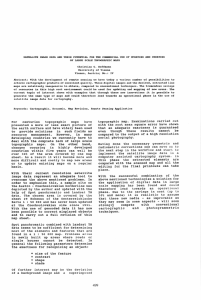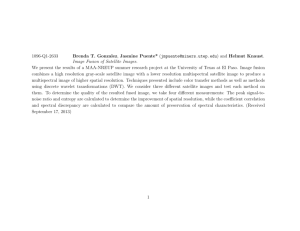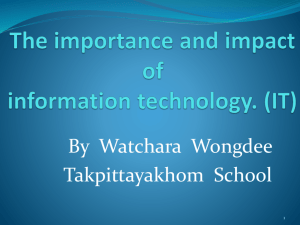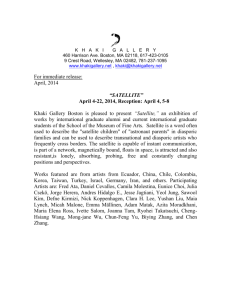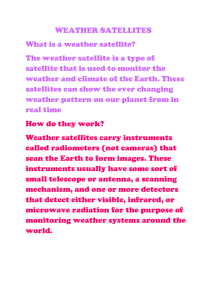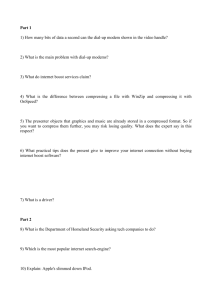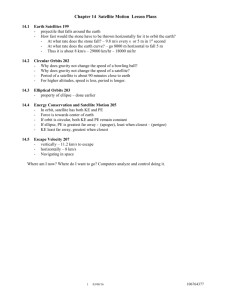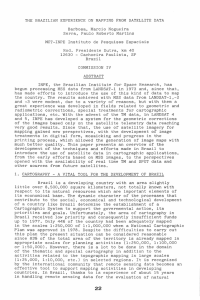THE SATELLITE IMAGE CHART OF ... CELSO GONQALO DIAS JUNIOR
advertisement
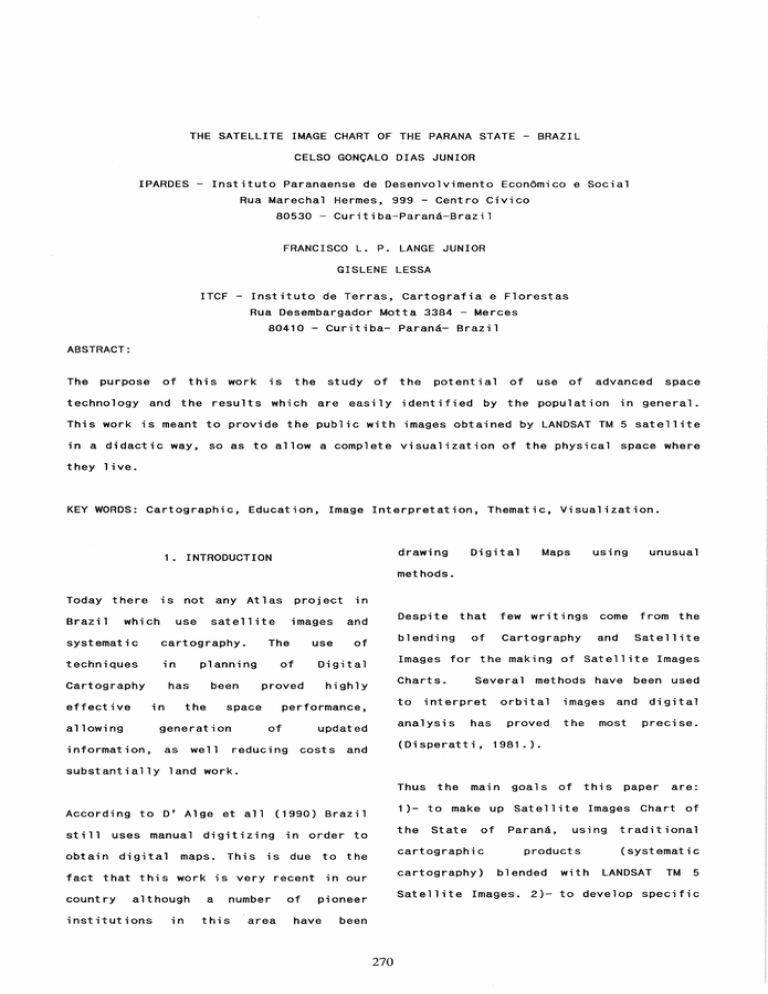
THE SATELLITE IMAGE CHART OF THE PARANA STATE - BRAZIL CELSO GONQALO DIAS JUNIOR IPARDES - Instituto Paranaense de Desenvolvimento EconOmico e Social Rua Marechal Hermes, 999 - Centro Civico 80530 - Curitiba-Parana-Brazil FRANCISCO L. P. LANGE JUNIOR GISLENE LESSA ITCF - Instituto de Terras, Cartografia e Florestas Rua Desembargador Motta 3384 - Merces 80410 - Curitiba- Parana- Brazil ABSTRACT: The purpose of this work is the study of the potential of use of advanced space technology and the results which are easily identified by the population in general. This work is meant to provide the public with images obtained by LANDSAT TM 5 satellite in a didactic way. so as to allow a complete visualization of the physical space where they live. KEY WORDS: Cartographic, Education, Image Interpretation, Thematic, Visualization. drawing 1. INTRODUCTION Digital using Maps unusual methods. Today there Brazil is not any Atlas project which use satellite systematic cartography. techniques in Cartography effective has in allowing information. as well use of of space generation and few writings come from the blending Cartography Charts. highly to performance, of and Satellite Several methods have been used interpret analysis updated of Despite that Images for the making of Satellite Images Digital proved been the images The planning in has orbital proved images and digital the most precise. (Disperatti, 1981.). reducing costs and substantially land work. Thus the main goals of this paper are: According to D' Alge et all (1990) Brazil 1)- to make up Sat e 11 it e Images Chart of still uses manual digitizing in order to the obtain digital maps. This is due to the cartographic fact that this work is very recent in our cartography) country Satellite Images. 2)- to develop specific although institutions in a number this area of pioneer have been 270 State of Parana, using products blended with traditional (syst emat i c LANDSAT TM 5 methodology. software included, Image Charts together with to INPE. make 3)- the using of satellite images. to contribute to spread the satellite image This work and its use as a teaching factor for the to a series of future projects which will public include in general, information where mainly about they the as source of physical (Lange live. space be an introduction Cartography Systematic plus LANDSAT TM 5 Satellite Images in a joint and Jr. intends to action Maximiano,1991). including the UFPR, ITCF, Ci ty IPARDES. INPE, Administration among others. This project covers the whole area of the State of Parana in a total ha .. , in the Souther-n of 20.120.300 Part of 2. METHODOLOGY AND MATERIALS Brazi 1 between the States of Sao Paulo and Santa Catarina 30' , between and 260 latitudes of 42'59' ·S & longitudinal areas of 480 02' 540 37' 38" WG.(Fig. 1) 220 2.1. Area of Study 29' between 24' 'WG and One of the wonderful regions of Parana's East, as was comprising plateau. chosen the This preserved a seaside region areas in Pi lot and the one of -is terms in the South of Brazil number of Parks (reservations) by men and are although first the best of forests Area natural where Ecological a Sites practically untouched located close to great urban centres like the Metropolitan Area of Curitiba, the State Capital City where a million and half people live.(Fig.2). This research allows us to obtain update data about the situation of the jungle in the area, use of forests, to contribute the soil and and to to the start process through Satellite projects of use a of the monitor i ng Images Charts, and to contribute as multiplying agent of new techniques Cartography and of use destroy for an updated the myth about 271 the county's boundaries, and the location 2.2.Materials used of In order to develop this paper, Charts of the Parks, Reservations, Roads, Dams and Cit i es. Topography were used; scale 1:250.000 out of Brazil DSG/IBGE, Systematic for space A Cartography articulation of the PC-AT type microcomputer, digital software, SITIM-150 plus table Scanner Selector of Laser Colours Hell 345. State of Parana. (Fig.3) 2.3 Methodology Used comprised basic transparent film- paper including county boundaries, parks, The method mapping work of recorded land reservations dams, roads, on limits, UTM references for and geographic necessary all coordinates city toponomy. technical the making of a satellite image chart. And, images of colour paper of LANDSAT TM 5 Satellite were used; several orbit-points, supportive An scale 1:250.000 in got to articulate at INPE image of LANDSAT TM 5 point-orbit 220/18 dated March 1, 1990 was chosen, of to be the Topographic 3,4 Charts. ( Fig. 4). and 5 passage and bands on its most recent havi ng t he sma 11 est mount of clouds over the area of interest. In the sequence the superposition of the mask over the satell ite image to adjust and correct possible distortions was made as an would region. attempt to create a clearly product represent the which actual Further, colour selection on the scanner was done to provide LANDSAT TM 5 photolytic image with high resolution. ITCF Charts well. compose of They the 1:50.000 were useful cartographic used as Using order to reliability test background of were in 272 photolytic was satellite image a performed using the reading of 20 identifiable point the original image and Popular reaction to the results surpassed both on the photolytic fi 1m generated by the scanner. The test any expectations. optimistic curiosity was aroused in a sort of awe as meant only to compare the image and the they noticed photolytic film coordinates. an artificial satellite. Lastly based on the tests, prints of the Thi s pi lot fou rt h test of the satell ite Their image were the image obtained through has already experiment in ed it ion a reached total of the 3.500 printed samples distributed. made by print experts. This 3.RESULTS satellite image chart has been wi de 1 y used as support and reference for An Image Satell ite Metropolitan Coastal Area Lines obtained of by the of the both Curitiba and Parana, was thus further work. The Satellite Image Chart Atlas to be the above described done by an agreement with INPE should use Th is Chart was automatized through met hodo logy. welcome of Chart great public most techniques in the generative process of adjusting the image to be the who showed interest in the subject thus allowing the cartographic information. project to be successful. A software 4. CONCLUSION AND RECOMMENDATION should This work which was included reached the ordinary people the basically satellite a teaching goal goals of and the usage, in image digital be developed for searching mosaicking image-mosaicking for different orbits. has providing with to images pilot-test seam-point two-dimensional the A method of recording photolithographing results of direct namely microcomputer the automatic should be using and PC-AT developed products of LANDSAT TM 5 in the making of order to prevent the satellite image charts as an essay to the generation of the photoliths. in possible distortions in build an Atlas. ACKNOWLEDGMENTS The results obtained in this project had a great Brazilian open i ng impact on scientific one more the media community reference and as This study was made possible by a the study well point agreement SEPL/IPARDES and between SCT/INPE. joint SEMA/ITCF, The authors are grateful to Mr. Paulo R. Martini, Mr. concerning topical mapping. 273 Paulo R. M. Serra and Mr. C.G. Lange Jr., their 1991. "Ut i 1 i za~Ao Fins de Paulo Albuquerque of the INPE assistance with the Image Processing. Mr. Hideo Araki The authors and Mrs. also thank Andrea for Iescheski of F.L.P. Simposio the Brasileiro algorithm Negra, SP., Vol. 1. model criticism. valuable and para of GTZ, "Two-Dimensional Dr. Vit6rio Sorot;uk, and Mr. Mariano M. Boschilia Macedo, constructive Antonio Paulo C. Mr. Ivai r Daros of of Mr. IPARDES comments Buono, Rohrbach and David ITCF, Dr. Emilio C. da "Avalia~Ao Mariane L. Barberi Mosaicking Algorithm Irregular Join-Line' , Engineering and Parana angustifolia(Bert), Sout h-West P.L .• Tommase 11 i, A. M. 1990. GeomAtrica de in: Aided Analysis Data."- London, 1989 - Searching in Mosaicking" and Remote 'A Allowing Remote Digital for An Photogrammetry Sensing, Vol.55, The Sao Paulo" por Mapping Forest (Braz i 1 ) , of pp. 253-257. of University of of Us i ng LANDSAT 1988. - "Anal i se In: V Simposio Bras; lei ro de Sensoriamento Remota, Natal, RN., Vol. 1, Araucaria The et a 11. da Exatidao Cartografica da Carta Imagem Obtidos AtravAs Pine Parana St at e Computer Serra No 1., pp.43-47. Imageadores 1981.- G., Engineering H.M.,1989.- 1, pp. 255-258. of Image Susanne, Sensoriamento Remoto - Manaus, AM .• Vol. Stands Urbano- Seam-Point Vieira, Qualidade A.A., Sensoriamento and Peng. P. Varredura". In: VI Simposio Brasileiro de Disperati, de support. and and Sanchez, Dispositivos L. Ernesto Documentos Cartograficos de na Sensing, Vol. 55, No 1. pp. 49-53. REFERENCES AND LITERATURE J.C.L. Li Photogrammetric very for Y., Digital who have drawn all graphics and maps. D'Alge, para Special Sh i ren, 0 SPOT Florestal Planejamento acknowledgements to Mr. Reinhard Heissler Bagg i Imagens G.A., Reserva Indigena de Mangueirinha-Pr." In: Remoto correction de Maximiano, Estratifica~ao University of Parana for their analyzing points and MSS London, Bedford College. 274
